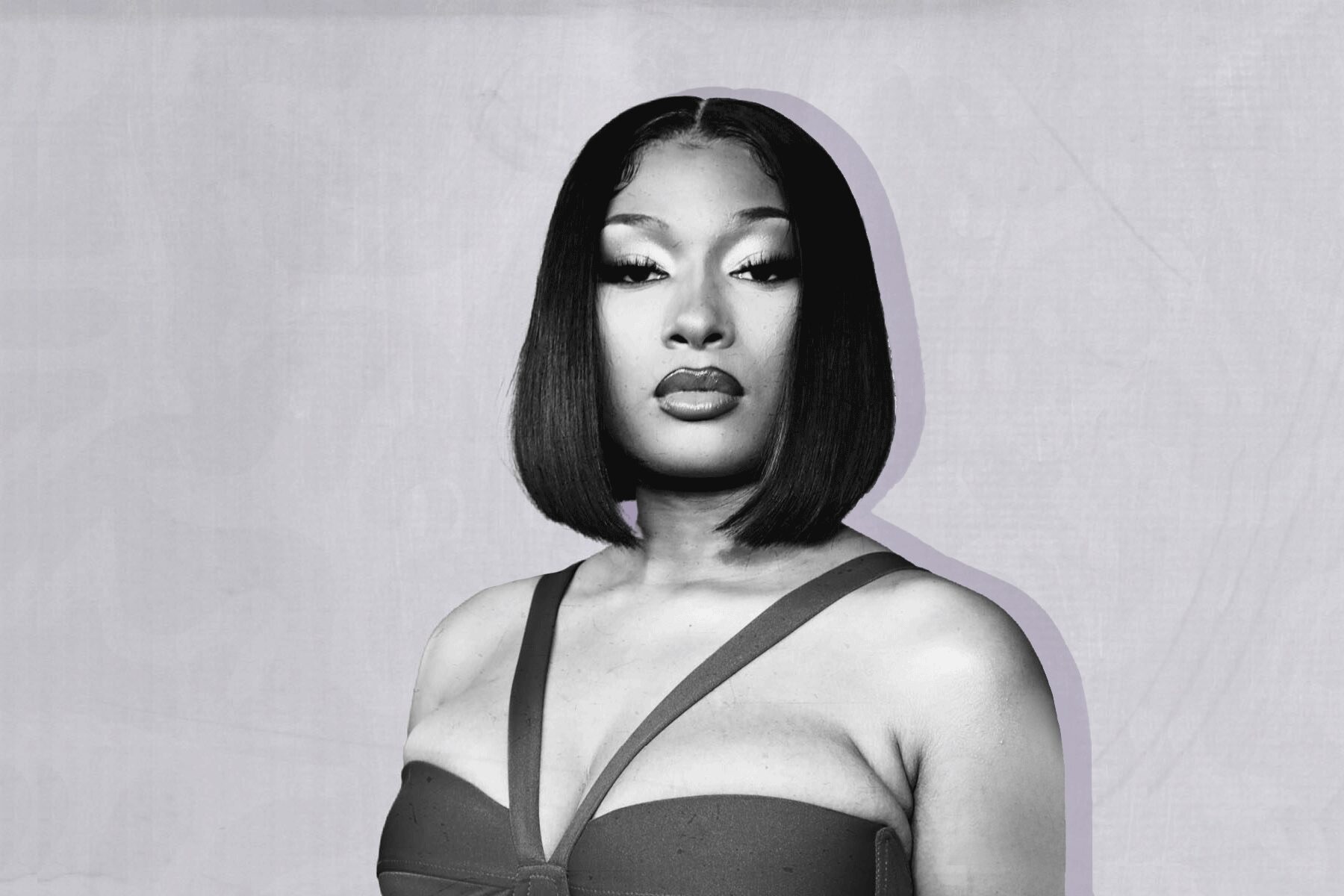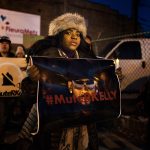Update: On December 23, a Los Angeles jury found Tory Lanez guilty of shooting Megan Thee Stallion, convicting him on three felony counts. He faces more than 20 years in prison.
It has happened before: A prominent woman in the entertainment industry accuses a man with fame of his own of violence.
Charges are filed. And almost instantly, the accuser is subject to trial by pop culture. People on Twitter call her a liar and worse. Memes with her likeness and words are deployed to mock and discredit her.
It happened recently with Amber Heard and Johnny Depp, and is currently playing out in a Los Angeles courtroom with Megan Thee Stallion, who has accused Tory Lanez of shooting her. But this latest case is compounded by the way that race and misogyny often combine to act as judge and jury for Black women in America — both within and outside of the courtroom.
Black women are in a Catch-22 when they speak out about domestic violence, said Antonia Randolph, an assistant professor at the University of North Carolina at Chapel Hill who studies misogyny in hip hop culture.
“Amber Heard is in a very different situation than Megan because she’s not a Black woman in the United States who is being called on repeatedly to uphold the cultural requirement to protect Black men against the criminal legal system,” Randolph told The 19th.
“It’s real that the criminal legal system disproportionately punishes Black and Brown men, but Black women are left holding the bag and have to protect Black men from the criminal legal system,” she said. “But then, Black women are also expected to stand up and speak out and appear strong — and then when they do so, they are seen as speaking for the whole Black community and can face backlash for that. White women are not faced with this impossible dilemma.”
Police arrested Lanez during a traffic stop on July 12, 2020, after receiving reports of gunfire from a group leaving Kylie Jenner’s Hollywood Hills home in Los Angeles. At the time, Megan Thee Stallion, whose real name is Megan Pete, was taken to the hospital for a foot injury — one she initially told police was the result of stepping on broken glass and later said was actually the result of having been shot in the foot by Lanez after a dispute while leaving Jenner’s. The surgeon who treated Megan Thee Stallion in the hospital for her foot injury testified this week to seeing gunshot wounds in her foot, as well as seeing bullet fragments on X-ray imaging. Megan Thee Stallion testified this week that she still experiences pain and nerve damage in her feet.
Lanez, whose real name is Daystar Peterson, is charged with assault with a semiautomatic handgun; carrying a loaded, unregistered firearm in a vehicle; and discharging a firearm with gross negligence. He has pleaded not guilty to all charges.
Since coming forward with her accusations against Lanez, Megan Thee Stallion has faced a lot of hatred directed toward her from the Internet and within her industry: Drake put out a song saying she lied and “didn’t get the joke.” But other Black women have also rallied around her. Randolph said the Lanez trial represents something that so many Black women have found themselves running up against, famous or not.
Megan Thee Stallion took the stand this week to describe the events surrounding Lanez’s 2020 arrest. In her testimony, she spoke directly about many of these dynamics, and described feeling trapped the night of the alleged shooting: “I don’t feel safe in the car. I don’t feel safe with the police.”
She also spoke to the hate she has received: “Because I was shot, I’ve been turned into some kind of villain, and he’s the victim. This has messed up my whole life. … This whole situation in the industry is like a big boy’s club.”
Tia Tyree, a professor of communications at Howard University whose research focuses on hip-hop, rap, and African-American and female representations in media, called out the lack of belief faced by Black women.
“Often, Black women don’t get the privilege of being victims,” Tyree said. “Often in society, Black women are the second to be seen as someone who has been victimized, second to be seen as someone who has legitimate health care problems, second to be seen as someone facing real social ills. So when Black women come forward, they are not believed.”
Tyree explained that this creates a cycle of intense stigma for Black women. Tyree said her research has shown that victims are also concerned about how their community — their neighbors, friends and church — will react and whether they will impose social consequences.
This is further complicated by the reality that “the Black community knows, understands and believes that the court system does not work for us and often fails us,” Tyree said.
“As Black female victims move toward usage of a system that may or may not provide the justice we deserve and seek, there will always be trepidation, there will always be concern, there will always be doubt about whether you should utilize the very system that’s there to protect you,” she continued. “But Black women should remember that you have the voice and right to do it. You should never silence yourself because when you do, you allow the person who has been the victimizer to win without consequence.”
Many women, and Black women especially, have rallied around Megan Thee Stallion, especially as the villainization around her has ramped up.
From the beginning, Megan Thee Stallion herself has spoken to the role she knows she is playing on behalf of Black women by testifying for the state against Lanez and publicly discussing her alleged assault, including in an op-ed for The New York Times in 2020. In addition to the open letter released last month and signed by women including #MeToo founder Tarana Burke and Rep. Maxine Waters, social media is filled with posts from women about what Megan Thee Stallion’s words and presence have meant to them.
For many, the difficulty Megan Thee Stallion has faced in speaking out is familiar.
Women — especially women of color and especially Black women — are often doubted, said Deborah Tuerkheimer, a professor at Northwestern Law and the author of the book “Credible: Why We Doubt Accusers and Protect Abusers.” It’s often assumed that they are not telling the truth, that they are to blame — or that what happens doesn’t really matter.
“Those who are the most vulnerable and the most marginalized are the least likely to be seen as reliable sources of information,” Tuerkheimer said. “The way that translates is that women, and especially women of color, have enormous obstacles to surmount when they come forward with allegations of any kind — especially allegations of gender-based violence and especially when those allegations are made against a powerful man.”
She stressed that there is often a “care gap” when it comes to any form of gender-based violence, with survivors often reporting that it wasn’t that they are not believed, but that no one cared enough about their stories to pursue any meaningful form of accountability. Black women particularly are often treated by society as if they aren’t important enough to justify accountability.
“In the end, this is really about who gets to disrupt the status quo and gets to destabilize entrenched power dynamics — and about who is seen as important enough to do that,” Tuerkheimer said.
An additional layer for Megan Thee Stallion, Randolph said, is hip-hop culture itself. She found fame not through the record industry but through social media, growing a fan base of women and queer fans.
“Megan’s fan base is not just cis men, and I suspect that’s why there has been such a backlash against her,” Randolph said. “She doesn’t need to play to the traditional male fan base or the music industry.She doesn’t act like she owes her career to the music industry and male rappers. I think that’s threatening to a male-dominated industry.”
Randolph continued: “Hip-hop culture has done a lot to parade misogyny and has a lot to answer for in promoting misogyny. Hip-hop culture has made it so that it is harder to be empathetic when women come forward about domestic violence. Misogyny predates hip-hop, but hip-hop has been a space that has made misogyny profitable and made it so that violence toward Black women is fun to watch and pleasurable. If that’s going on in the background, then it is harder as a culture to be empathetic to women’s truth.”
Per instructions from the judge, the jury is now prepared to review additional evidence over the weekend and next week.
Tyree said she hopes that Black women see Megan Thee Stallion as a woman who is standing up for herself and that people understand what makes her actions so remarkable.
“I am hopeful that she becomes the face of progress, that she becomes the face of what it looks like to stand in your truth and stand in the quest to be heard and seek justice,” Tyree said.






